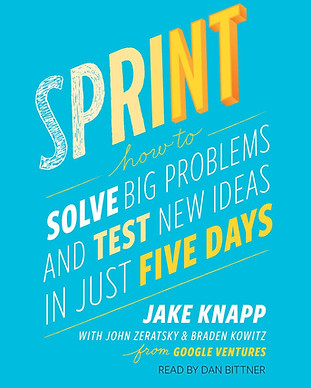Reading List
Making time for reading has always been a struggle for me. Maybe it's because I read at a sloth-like pace or maybe it's because my Netflix queue never seems to shrink. Excuses aside, these are some books I've picked up recently. I've included my honest opinions and notable takeaways. If you've got recommendations for others, you know how to reach me!

At the risk of sounding dramatic, this book was life-changing for me. I facilitated my first Design Sprint in the spring of 2018, and I've looked at problem solving differently ever since. A couple of the most impactful practices I took from this book are:
Put time limits on your work. If you have an hour, it'll take an hour. But what if you give yourself 50 minutes? You'll prioritize the important stuff, eliminate distractions, and produce an equally valuable product. Oh, and you'll actually have time to use the bathroom before your next meeting.
You're smarter when you work alone. The influence of others can be helpful when you're making a binary decision (Should I or shouldn't I?), but when it comes to ideation, that influence is more commonly a hindrance. Don't let the ideas of others negate your own stream of creativity. Reject the idea of group brainstorming, and trust your own ability to create excellence.
Seek the perspective of others. Efficiencies are found when we alter a process, but they're most impactful when we have a holistic understanding of that process. Understanding how all stakeholders contribute to and are hindered by a process is the fastest way to drive efficiency. Ask lots of questions and make sure stakeholders are heard.

This book has increased my capacity for strategic thinking at all levels of my career. It outlines the benefits of thinking like the boss, even when you're not the boss. This mindset not only prepares you for future responsibilities but instills in your superiors a level of trust that typically results in the freedom to execute without strict oversight.
I'm looking forward to seeing Captain Abrashoff as the keynote speaker at PMI Mile Hi Symposium in February of 2020.

Review Coming Soon!

Welp, I will be the first to admit that I didn't actually read this book. Whose got time for 560 pages these days? The audiobook, however, was a welcome addition to my commute for a solid month.
When it comes to matters of political interest, I don't always agree with Thomas Friedman, but I think he makes some interesting, if not long-winded, points when it comes to constantly changing social and economical environments.
-
As innovation continues to accelerate, emphasis will be placed on employees' STEMpathy - that is, their understanding of science, technology, engineering, and math paired with their ability to empathize with stakeholders to drive change.
-
We should all adopt a mentality of assuming positive intent. Friedman discusses how healthy communities (be them neighborhoods or corporations) work under the pretense that members are innocent until proven guilty. And even then, he says, people will cut you slack if you made a good faith effort. How different would our world look if we didn't immediately jump to negative conclusions?
-
Leadership was a significant theme in this book and one on which I'm always curious to hear new perspectives. Friedman quoted Ronald Heifetz, a Professor at the Harvard Kennedy School of Government, as saying, "The role of a leader is to help people face reality and to mobilize them to make change as their environment changes to ensure the security and prosperity of their community." I love this community-centric approach and appreciate that we often forget the humanitarian requirement of true leadership.

My biggest takeaway from this book is the 7-38-55 Rule. That is, only 7% of a message is based on the words you speak, while 38% comes from the tone of your voice and 55% is based on your body language and facial expressions. This is in contrast to how we typically direct our attention. I often find myself intently focused on the words I speak, concentrating on clarity and conciseness as mechanisms of influence. However, the demeanor with which I convey my message and how I make people feel is far more influential in my ability to negotiate and gain influence. We'll chalk that up as a work in progress for me.

I think moms these days experience an overload of information (and judgement!), so I almost hesitate to express an opinion on childrearing practices. That being said, I do think this book provides a unique insight into the influence we have over our children and the importance of structure in their lives.
As a result of this book, I plan to treat my child more like a human and less like an inconvenience. Everything is new to a child, so I hope I have the patience to explain my actions and can inspire curiosity instead of fear.
Also...the discrepancy in child care providers in the US is an embarrassment, but I'll stay off that soap box for now!

I was gifted this book by a former boss, who, on the inside cover, wrote, "Your passion, drive, and knowledge are key to achieving your career goals. I hope this book helps to define your leadership style and you can find ways to share your learnings with others." What I learned from this book and from that boss was that leadership is not about you but about helping those around you succeed. This is a very simple lesson that is exceedingly difficult to practice. A few of my favorite quotes from this book include:
-
"One of the most important jobs of any leader is to support your own boss."
-
"Leaders must own everything in their world. There is no one else to blame."
-
"You must brief to ensure the lowest common denominator on the team understands."